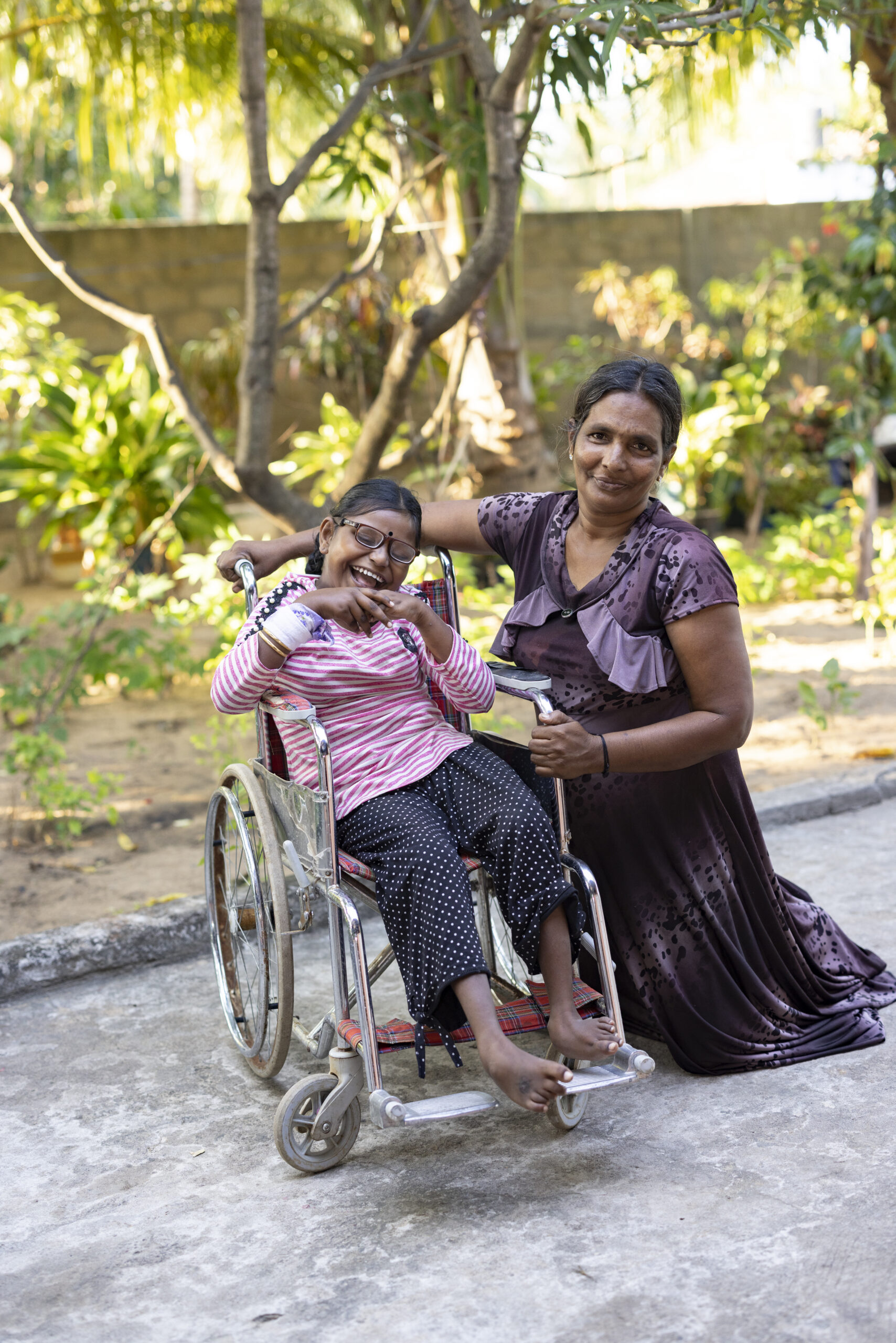To mark International Day of Persons with Disabilities (IDPwD), celebrated on December 3, we’re sharing the story of Mithusa, a young girl with cerebral palsy living in poverty in Sri Lanka. With the support of her mum and ChildFund Australia, Mithusa is receiving the care and tools she needs to reach her full potential.
When she was born, Mithusa, 13, showed no emotion. “She wouldn’t smile. She wouldn’t even turn over,” says her mum, Uthakumari. By her first birthday, Mithusa was diagnosed with cerebral palsy. In their small community in Northern Sri Lanka, professional support was hard to come by.
“People advised me to abandon her. At 18 months, one doctor told me, ‘Don’t bring her back here again. She’s a lost cause’,” recalls Uthakumari.
For the first seven years of her life, Mithusa only ever left home to attend health care visits. She was isolated in bed, without the ability to sit up. She drooled constantly, suffered epileptic seizures, hit those around her, wouldn’t talk and communicated very little otherwise with her family.
But Uthakumari refused to give up on her daughter.
One day a volunteer knocked on the door and invited Mithusa and her mum to attend a health clinic supported by ChildFund. This would be the beginning of a long journey out of isolation for Mithusa.
“People advised me to abandon her. At 18 months, one doctor told me, ‘Don’t bring her back here again. She’s a lost cause’.”
At the health clinic, Mithusa was evaluated and afterwards enrolled in ChildFund’s community-based Inclusive Development project. At just seven years old, health care workers were hopeful that Mithusa would, at minimum, be successful in keeping her cerebral palsy from progressing and further reducing Mithusa’s mobility. A care plan was established with physical therapists and Uthakumari was trained on how to perform daily physical therapy at home with her daughter. Mithusa also began attending speech therapy classes.
The first milestone was reached within a year. “I began stimulating her cheek muscles, and this stopped her from constantly salivating,” says Uthakumari. “This gave me hope that other issues could be improved, too.” With daily physical therapy, Mithusa began to sit up in a chair. She gradually began to communicate more and more non-verbally until she eventually started to mouth words.

“I always saw improvements with every bit of effort I put in,” recalls Uthakumari. “Now I’d say she’s improved about 90%.”
Today, Mithusa recognises and interacts with the people around her. She’s talkative and bubbly and is beginning to manoeuvre her own wheelchair, which was provided to her by ChildFund. “She’s constantly smiling and has joy inside her. All of this was not there before, but I knew it would happen,” says Uthakumari.
ChildFund works with schools in Northern Sri Lanka to be more inclusive of children with disabilities. As a result of great awareness and funding, Mithusa’s local school hired a special education teacher for her and other children with disabilities in the area. ChildFund also provided teacher training, resources and equipment to the school.
Mithusa started attending school two years ago and now attends five days a week. She’s continuing to improve in her speech. She is drawing and recognising letters. Her behaviour has also improved. “She’s broken at least 20 pairs of glasses before, but this pair she’s had for over six months,” says Uthakumari, adding that Mithusa now recognises the need and value of her glasses and wants to protect them.
“She will definitely walk. I know, one day, she will get up out of that chair and walk.”
Recently, Mithusa and her mother were waiting by the roadside for a public bus to transport them to the physical therapy clinic. As often happens, the approaching driver and conductor realised that allowing Mithusa and her wheelchair to board would take too much time. They sped off without them to find customers who could board more quickly. Though this happens frequently, one thing had changed. This time, Mithusa questioned her reality. “Why won’t they let me ride the bus?” she asked her mum.
Today, Mithusa is working on her next milestone. She’s beginning to stand, albeit with the help of leg braces. “She will definitely walk,” states Uthakumari. “I know, one day, she will get up out of that chair and walk.”
Show your support this International Day of Persons with Disabilities and help more children and youth like Mithusa reach their full potential by donating a wheelchair, walker – or both! Your gift will be a source of freedom, independence, resilience and health. A wheelchair or walker can help a child get to school, be with their peers, and receive an education that opens them to greater opportunities in the future. Check out our Gifts for Good catalogue and donate today.
Find out more about IDPwD and how you can get involved here.






























